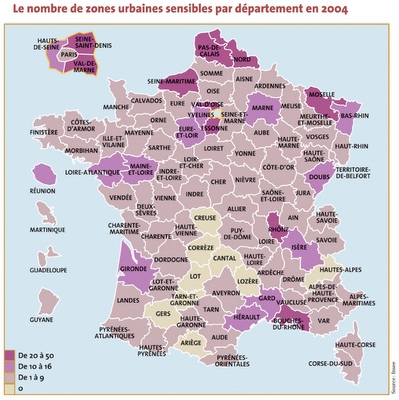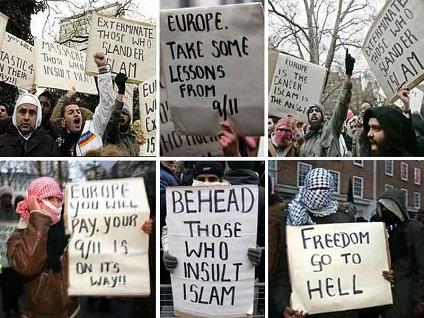European ‘No-Go’ Zones for Non-Muslims Proliferating
Islamic extremists are stepping up the creation of “no-go” areas in European cities that are off-limits to non-Muslims.
European ‘No-Go’ Zones for Non-Muslims Proliferating
Soeren Kern | Gatestone Institute | August 22, 2011
Islamic extremists are stepping up the creation of “no-go” areas in European cities that are off-limits to non-Muslims.
Many of the “no-go” zones function as microstates governed by Islamic Sharia law. Host-country authorities effectively have lost control in these areas and in many instances are unable to provide even basic public services such as police, fire fighting and ambulance services.
The “no-go” areas are the by-product of decades of multicultural policies that have encouraged Muslim immigrants to create parallel societies and remain segregated rather than become integrated into their European host nations.
In France, for example, large swaths of Muslim neighborhoods are now considered “no-go” zones by French police. At last count, there are 751 Sensitive Urban Zones (Zones Urbaines Sensibles, ZUS), as they are euphemistically called. A complete list of the ZUS can be found on a French government website, complete with satellite maps and precise street demarcations. An estimated 5 million Muslims live in the ZUS, parts of France over which the French state has lost control.
Muslim immigrants are taking control of other parts of France too. In Paris and other French cities with high Muslim populations, such as Lyons, Marseilles and Toulouse, thousands of Muslims are closing off streets and sidewalks (and by extension, are closing down local businesses and trapping non-Muslim residents in their homes and offices) to accommodate overflowing crowds for Friday prayers. Some mosques have also begun broadcasting sermons and chants of “Allahu Akbar” via loudspeakers in the streets.
The weekly spectacles, which have been documented by dozens of videos posted on Youtube.com (here, here, here, here, here, here, here, here and here), and which have been denounced as an “occupation without tanks or soldiers,” have provoked anger and disbelief. But despite many public complaints, local authorities have declined to intervene because they are afraid of sparking riots.
In Britain, a Muslim group called Muslims Against the Crusades has launched a campaign to turn twelve British cities – including what it calls “Londonistan” – into independent Islamic states. The so-called Islamic Emirates would function as autonomous enclaves ruled by Islamic Sharia law and operate entirely outside British jurisprudence.
The Islamic Emirates Project names the British cities of Birmingham, Bradford, Derby, Dewsbury, Leeds, Leicester, Liverpool, Luton, Manchester, Sheffield, as well as Waltham Forest in northeast London and Tower Hamlets in East London as territories to be targeted for blanket Sharia rule.
In the Tower Hamlets area of East London (also known as the Islamic Republic of Tower Hamlets), for example, extremist Muslim preachers, called the Tower Hamlets Taliban, regularly issue death threats to women who refuse to wear Islamic veils. Neighborhood streets have been plastered with posters declaring “You are entering a Sharia controlled zone: Islamic rules enforced.” And street advertising deemed offensive to Muslims is regularly vandalized or blacked out with spray paint.
In the Bury Park area of Luton, Muslims have been accused of “ethnic cleansing” by harassing non-Muslims to the point that many of them move out of Muslim neighborhoods. In the West Midlands, two Christian preachers have accused of “hate crimes” for handing out gospel leaflets in a predominantly Muslim area of Birmingham. In Leytonstone in east London, the Muslim extremist Abu Izzadeen heckled the former Home Secretary John Reid by saying: “How dare you come to a Muslim area.”
In the Belgian capital of Brussels (which is 20% Muslim), several immigrant neighborhoods have become “no-go” zones for police officers, who frequently are pelted with rocks by Muslim youth. In the Kuregem district of Brussels, which often resembles an urban war zone, police are forced to patrol the area with two police cars: one car to carry out the patrols and another car to prevent the first car from being attacked. In the Molenbeek district of Brussels, police have been ordered not to drink coffee or eat a sandwich in public during the Islamic month of Ramadan.
In Germany, Chief Police Commissioner Bernhard Witthaut, in an August 1 interview with the newspaper Der Westen, revealed that Muslim immigrants are imposing “no-go” zones in cities across Germany at an alarming rate.
The interviewer asked Witthaut: “Are there urban areas – for example in the Ruhr – districts and housing blocks that are “no-go areas,” meaning that they can no longer be secured by the police?” Witthaut replied: “Every police commissioner and interior minister will deny it. But of course we know where we can go with the police car and where, even initially, only with the personnel carrier. The reason is that our colleagues can no longer feel safe there in twos and have to fear becoming the victim of a crime themselves. We know that these areas exist. Even worse: in these areas crimes no longer result in charges. They are left ‘to themselves.’ Only in the worst cases do we in the police learn anything about it. The power of the state is completely out of the picture.”
In Italy, Muslims have been commandeering the Piazza Venezia in Rome for public prayers. In Bologna, Muslims repeatedly have threatened to bomb the San Petronio cathedral because it contains a 600-year-old fresco inspired by Dante’s Inferno which depicts Mohammed being tormented in hell.
In the Netherlands, a Dutch court ordered the government to release to the public a politically incorrect list of 40 “no-go” zones in Holland. The top five Muslim problem neighborhoods are in Amsterdam, Rotterdam and Utrecht. The Kolenkit area in Amsterdam is the number one Muslim “problem district” in the country. The next three districts are in Rotterdam – Pendrecht, het Oude Noorden and Bloemhof. The Ondiep district in Utrecht is in the fifth position, followed by Rivierenwijk (Deventer), Spangen (Rotterdam), Oude Westen (Rotterdam), Heechterp/ Schieringen (Leeuwarden) and Noord-Oost (Maastricht).
In Sweden, which has some of the most liberal immigration laws in Europe, large swaths of the southern city of Malmö – which is more than 25% Muslim – are “no-go” zones for non-Muslims. Fire and emergency workers, for example, refuse to enter Malmö’s mostly Muslim Rosengaard district without police escorts. The male unemployment rate in Rosengaard is estimated to be above 80%. When fire fighters attempted to put out a fire at Malmö’s main mosque, they were attacked by stone throwers.
In the Swedish city of Gothenburg, Muslim youth have been hurling petrol bombs at police cars. In the city’s Angered district, where more than 15 police cars have been destroyed, teenagers have also bee pointing green lasers at the eyes of police officers, some of whom have been temporarily blinded.
In Gothenburg’s Backa district, youth have been throwing stones at patrolling officers. Gothenburg police have also been struggling to deal with the problem of Muslim teenagers burning cars and attacking emergency services in several areas of the city.
According to the Malmö-based Imam Adly Abu Hajar: “Sweden is the best Islamic state.”
Soeren Kern is a Senior Fellow at the New York-based Gatestone Institute. He is also Senior Fellow for European Politics at the Madrid-based Grupo de Estudios Estratégicos / Strategic Studies Group. Follow him on Facebook and on Twitter.




